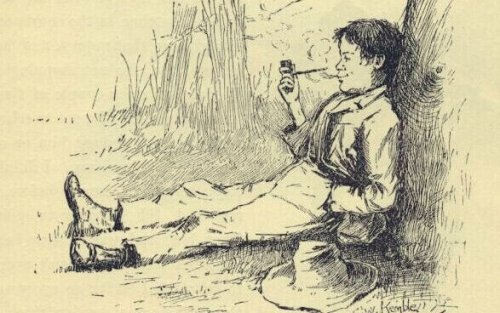Huckleberry Finn Syndrome

A syndrome is a set of medical signs and symptoms that are related to each other. They’re part of a medical profile that affects a person’s well-being. Huckleberry Finn syndrome is a perfect example of this.
Huckleberry Finn is a character Mark Twain created in one of his novels. Finn appears in many of the great American author’s novels. However, it’s in The Adventures of Huckleberry Finn where we get a clearer view of his character and problems.
Before describing the characteristics of this syndrome, it’s important to note that Huckleberry Finn syndrome is a creation of popular psychology. Medical literature makes no reference to it being a psychological or psychiatric problem. However, it provides an interesting description of certain personalities which are worth mentioning.
“It’s never too late to have a happy childhood.”
-Tom Robbins-
Who’s Huckleberry Finn?
Mark Twain’s most famous character was Tom Sawyer. He was a brave, defiant, and cunning boy who always got into trouble. However, he always managed to come out ahead. Huckleberry Finn was one of his best friends.

Huckleberry Finn’s essential quality was that he wasn’t concerned with his responsibilities. He missed school and didn’t care about his commitments. At first, Finn appeared as a secondary character in The Adventures of Tom Sawyer. However, he was so captivating that Twain decided to write a novel dedicated exclusively to him.
In that novel, Twain showed us the boy’s personality, which contrasted greatly with Tom Sawyer’s. Huck, unlike Tom, was an abandoned child. He lived with his aunt and his father was evil and an alcoholic, a real threat to him.
In the book, his father kidnaps him and holds him captive. But Huck manages to escape and Jim, a runaway slave, helps him out. Both experience dangerous and exciting adventures until they’re rescued by the brave Tom Sawyer. As it appears, all of this resembles a psychological condition known as Huckleberry Finn syndrome.
The two basic characteristics of Huckleberry Finn syndrome
A psychological structure emerges from being neglected and growing up with a cruel father. The two basic characteristics of this syndrome are an existential void and the eternal pursuit of whatever relieves pain or causes happiness.

Let’s analyze these two essential characteristics present in Huckleberry Finn syndrome:
- Existential void. It’s the intense feeling of lacking something that gives life meaning. It’s constant displeasure and a feeling of permanent emptiness. It’s very similar to what our idea of depression looks like.
- Eternal pursuit. As a result of the above, in Huckleberry Finn syndrome there’s an endless search for something that can finally fill that empty feeling. It’s a deep desire to find some reality in order to feel complete.
As we can observe, behind that mask of carelessness there’s an unease that can’t be satisfied. A lack of purpose leads people with this syndrome to look everywhere, trying to find meaning.
Other traits that characterize Huckleberry Finn syndrome
Besides the two basic traits, there are other characteristics that define Huckleberry Finn syndrome. The people who suffer from it are usually remarkably intelligent. This is proven by their ability to solve various problems. In addition to this:
- They find it relatively easy to adapt to different situations, but deep down they’re never really comfortable with anything.
- They dodge responsibilities. This is because they reject the idea of rooting themselves since they’ve never had any solid roots.
- An unhappy childhood and a very destructive father figure.
- A very low self-esteem. They don’t consider themselves valuable and are prone to suffering from depression due to that fact.
- They’re constantly changing friends, partners, jobs, etc. It’s difficult for them to find stability in their lives.

A lack of healthy family bonds causes both the feeling of emptiness and the difficulty of working on solid life goals. This leads to an interesting yet complex personality. Can Huckleberry Finn syndrome be overcome? Yes, of course. With support and willingness, it’s possible to reconcile with oneself and a difficult past.
A syndrome is a set of medical signs and symptoms that are related to each other. They’re part of a medical profile that affects a person’s well-being. Huckleberry Finn syndrome is a perfect example of this.
Huckleberry Finn is a character Mark Twain created in one of his novels. Finn appears in many of the great American author’s novels. However, it’s in The Adventures of Huckleberry Finn where we get a clearer view of his character and problems.
Before describing the characteristics of this syndrome, it’s important to note that Huckleberry Finn syndrome is a creation of popular psychology. Medical literature makes no reference to it being a psychological or psychiatric problem. However, it provides an interesting description of certain personalities which are worth mentioning.
“It’s never too late to have a happy childhood.”
-Tom Robbins-
Who’s Huckleberry Finn?
Mark Twain’s most famous character was Tom Sawyer. He was a brave, defiant, and cunning boy who always got into trouble. However, he always managed to come out ahead. Huckleberry Finn was one of his best friends.

Huckleberry Finn’s essential quality was that he wasn’t concerned with his responsibilities. He missed school and didn’t care about his commitments. At first, Finn appeared as a secondary character in The Adventures of Tom Sawyer. However, he was so captivating that Twain decided to write a novel dedicated exclusively to him.
In that novel, Twain showed us the boy’s personality, which contrasted greatly with Tom Sawyer’s. Huck, unlike Tom, was an abandoned child. He lived with his aunt and his father was evil and an alcoholic, a real threat to him.
In the book, his father kidnaps him and holds him captive. But Huck manages to escape and Jim, a runaway slave, helps him out. Both experience dangerous and exciting adventures until they’re rescued by the brave Tom Sawyer. As it appears, all of this resembles a psychological condition known as Huckleberry Finn syndrome.
The two basic characteristics of Huckleberry Finn syndrome
A psychological structure emerges from being neglected and growing up with a cruel father. The two basic characteristics of this syndrome are an existential void and the eternal pursuit of whatever relieves pain or causes happiness.

Let’s analyze these two essential characteristics present in Huckleberry Finn syndrome:
- Existential void. It’s the intense feeling of lacking something that gives life meaning. It’s constant displeasure and a feeling of permanent emptiness. It’s very similar to what our idea of depression looks like.
- Eternal pursuit. As a result of the above, in Huckleberry Finn syndrome there’s an endless search for something that can finally fill that empty feeling. It’s a deep desire to find some reality in order to feel complete.
As we can observe, behind that mask of carelessness there’s an unease that can’t be satisfied. A lack of purpose leads people with this syndrome to look everywhere, trying to find meaning.
Other traits that characterize Huckleberry Finn syndrome
Besides the two basic traits, there are other characteristics that define Huckleberry Finn syndrome. The people who suffer from it are usually remarkably intelligent. This is proven by their ability to solve various problems. In addition to this:
- They find it relatively easy to adapt to different situations, but deep down they’re never really comfortable with anything.
- They dodge responsibilities. This is because they reject the idea of rooting themselves since they’ve never had any solid roots.
- An unhappy childhood and a very destructive father figure.
- A very low self-esteem. They don’t consider themselves valuable and are prone to suffering from depression due to that fact.
- They’re constantly changing friends, partners, jobs, etc. It’s difficult for them to find stability in their lives.

A lack of healthy family bonds causes both the feeling of emptiness and the difficulty of working on solid life goals. This leads to an interesting yet complex personality. Can Huckleberry Finn syndrome be overcome? Yes, of course. With support and willingness, it’s possible to reconcile with oneself and a difficult past.
This text is provided for informational purposes only and does not replace consultation with a professional. If in doubt, consult your specialist.







